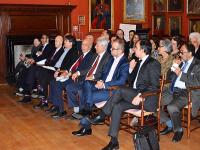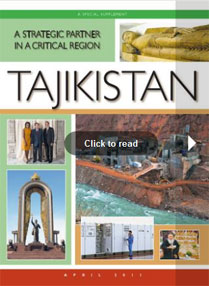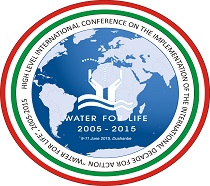Postion of the Republic of Tajikistan on Priority Issues of the Agenda of the 70th session of the UNGA
POSITION
of the Republic of Tajikistan
on Priority Issues
of the Agenda of the 70th session of the UNGA
1. The forthcoming UNGA 70th session is called upon to become an important milestone in consolidation of actions undertaken by the UN member states on maintaining international security and sustainable development. The United Nations is the most reputable universal international organization, and it remains the central platform for achieving consensus on international security and development, for coordinating collective efforts of the international community at addressing global challenges and threats of the new generation. The basic norms and principles of the UN Charter continue to be of fundamental significance for intergovernmental relations.
2. It is not possible to address new issues without strengthening and reforming the UN system. The comprehensive reform of the UN should contribute to strengthening and enhancing of its effectiveness, so that the UN could timely and adequately respond to the developments around the world, and to efficiently address today’s challenges and threats. The principles for the UN reform should be in harmony with the UN Charter principles and goals. We support the constructive discussions, within the framework of the Ad Hoc Working Group, on revitalization of the work of the General Assembly (AHWG), aimed at searching for ways of enhancing the role and efficiency of the GA. The reform of the Security Council is an integral part of the comprehensive reform of the UN. We call for an equitable representation in the Security Council and enlargement of its membership in both categories. We are interested in a broad and equitable representation of interests of developing countries during the SC reform.
3.The UN plays the central role in the organization of a timely and coordinated response to conflicts in the world and regions. The success of actions in the sphere of prevention and settlement of conflicts depends on efficient use of tools of preventive diplomacy and mediation, concerted search for diplomatic and peaceful ways of resolving crises and disputes, broadening of interaction and partnership with regional and subregional organizations. Measures on post conflict rehabilitation should include a qualitative interaction with the host governments, reinforcement of national potential and government institutions, introduction of effective mechanisms of mobilization and coordination of external resources, real assistance in rehabilitating the foundation and infrastructures for development, and addressing economic and social issues. The UN peacemaking activities, including peacekeeping operations and special political missions , are vital tools for maintenance of peace and security, settlement of conflicts, and post-conflict rehabilitation. Taking into account the ever-increasing needs in peacemaking 2
activities, we would increase the participation of the Tajikistan police officers in the UN peacekeeping operations.
4.Stable peace in the Middle East can be achieved only through a decision based on peaceful coexistence of two independent states, Palestine and Israel. We support the willingness of Palestine to take its place in the national community as a full-fledged member. We stand for a speedy resumption of negotiations between the State of Palestine and Israel.
5. We support the efforts of Afghanistan at building up and reinforcing the progress in addressing the issues of the transit period, strengthening of the national dialogue and reconciliation. We call for expanding a targeted assistance to Afghanistan aimed at economic rehabilitation, strengthening of the social sphere and creation of new jobs in the country.
Involvement of Afghanistan into the process of a multifaceted regional cooperation is key for success of the efforts undertaken by the international community. We are willing to take part in the rehabilitation of the social and economic infrastructure of Afghanistan through connecting the transport arteries of our two countries, creating an “energy bridge” CASA1000, providing the Afghan population with essential commodities and training specialists.
6. Strengthening of multilateral mechanisms of control over weapons, disarmament and non-proliferation is key to maintaining global security and stability. Establishment of nuclear free zones is an important component of nuclear disarmament and non-proliferation, expanding of cooperation on peaceful use of nuclear energy, and strengthening of regional and international peace and security. We emphasize the importance of acceleration of ratification of the Protocol to the Central Asian Nuclear- Weapon-Free-Zone Treaty (CANWFZ) signed on May 6, 2014 at the margins of the NPT PrepCom Conference. We call for a speedy enforcement of the Comprehensive Nuclear- Test-Ban Treaty (CTBT).
7. We attach importance to the efficient implementation of the Convention on the prohibition of the use, stockpiling, production and transfer of anti-personal mines and on their destruction (the Ottawa Convention). We actively call for Central Asia free from mines threat and strengthening of cooperation in the field of humanitarian demining.
8. The response to the ever-increasing threat of terrorism and extremism, the global challenge of today, should be comprehensive, with the UN as a coordinator. The UN global counter terrorism strategy, the UNGA and UNSC resolutions, and UN counterterrorism conventions form the backbone of joint fight against terrorism. The efforts should be focused on elimination of military infrastructure of international terrorism and blockage of the channels of its political, military and financial support, prevention of use of Internet for radicalization of moods, for recruiting and propaganda of extremism and violence.
Regional organizations play an important role in combating terrorism and extremism. We call for expanding the cooperation between the UN CTC and regional organizations, including OSCE, SCO, CSTO and CIS.
9. Prevention of illicit drug trafficking that has turned into a breeding ground for terrorism and organized crime, requires joint and coordinated actions of the part of the entire international community. During the period of its membership in the UN Commission on 3
Narcotic Drugs Tajikistan will focus its efforts on broadening efficient interaction and cooperation on combating the increase of global narcotic threat.
The forthcoming UNGA Special session on the world drugs problem in April 2016 is expected to provide a unique opportunity for searching for new and additional ways of strengthening of cooperation on combating the roots of drug problems and dealing with their consequences. In this context, in May 2015 there was held a High level International conference on consolidation of efforts of the international counterdrug cooperation. We do hope that the participants of UNGA Special session on the world drugs problem will support the initiative of the President of the Republic of Tajikistan to declare the years 2016-2020 as “A Five year Period for Global Measures on Preventing Drug Abuse and Promotion of Healthy Lifestyle”.
10. Accelerated spread of information and communication technologies (ICT) not only provides broad opportunities for development but also poses new and complex problems in the field of security. We support the activities of the United Nations Group of Governmental Experts (GGE) on Developments in the Field of Information and Telecommunications in the Context of International Security. We believe that the efforts should be aimed at preventing ill-intended use of ICT, expanding of information exchange and mutual support in preventing illegal actions involving use of ICT, and also at strengthening of measures of confidence, cooperation and capacity building.
11. The WSIS + 10 review High-level meeting to be held in December 2015 is an important milestone for discussions of the role of ICT in achieving sustainable development. Our hope is that alongside with this subject, the meeting will focus on bridging the digital divide and setting up information and communication infrastructures, strengthening of confidence and security, and preservation of cultural and linguistic diversity.
12. The UN Human Rights Council (HRC) is a central forum for streamlining a dialogue and cooperation in the field of promotion and protection of human rights. The main priorities pursued by Tajikistan in HRC are strengthening of international mechanisms of human rights protection, bona fide enforcement of the commitments undertaken in this area, expanding of multilateral cooperation in the field of promotion and protection of human rights. We support the continuation of a constructive dialogue within the implementation of second cycle of the Universal Periodic Review.
13. We condemn all forms of discrimination, in particular, racism, xenophobia and related intolerance that ignores human rights and insults human faith, dignity, culture, nationality and other human values. We support comprehensive implementation of and the follow-up to the Durban Declaration and Program of Action.
14. We note the central role of the UN in combating human trafficking, which turned into one of the worst forms of violation of human rights and freedoms. More attention should be paid to the strategies aimed at protection and rehabilitation of victims of human trafficking. Setting up regional and international mechanisms of cooperation to combat human trafficking is an important component in the struggle against this evil. We participate in the work of the Group of Friends United against human trafficking.
15. The UN Commission on the Status of Women is the main intergovernmental forum for promotion of gender equality, empowerment of women and increasing their participation in all spheres of life. The 60th session of the UN Commission on the Status of Women provides a timely opportunity for discussing the ways of active and creative involvement of 4
women in the process of achieving sustainable development, promoting equality and eliminating all forms of violence against women.
16. The central event of the forthcoming UNGA will become the UN Summit for the adoption of the post-2015 development agenda, to be held on 25-27 September 2015. We hope that the Summit will sum up the progress achieved during the intergovernmental process of development of the post-2015 development agenda and will adopt a new program of action for achieving the Sustainable Development Goals (SDGs) by 2030.
The main goals and most important prerequisites to sustainable development are as follows:
eradication of poverty and inequality, promotion and introduction of sustainable models of production and consumption, protection and rational use of natural resources, promotion of sustainable economic growth and social integration, creation of employment opportunities and dignified jobs for everyone.
17. The plans and programs of action in the field of sustainable development should be reinforced by adequate means of implementation, in particular, by mobilization of additional financial recourses, reduction of burden of external debts, expanding of technology transfers and reinforcement of national capacity. In this regard, efficient implementation of the decisions of the Third International conference on financing for development (Addis Ababa, July 13-16, 2015) acquires special importance. It is obvious that the new conditions and realities require renewal and optimization of global partnership for sustainable development.
18. The High Level Political Forum on sustainable development is called to become an effective and universal platform for a regular and constructive dialogue and review of progress in the implementation of the SDGs, and for development and coordination of subsequent actions on achieving sustainable development.
19. The Economic and Social Council (ECOSOC) is the central intergovernmental forum for consideration of social, economic and ecological issues of the UN agenda. We have been actively participating in the following ECOSOC subsidiary bodies: Commission on Narcotic Drugs and Commission on the Status of Women. Tajikistan is willing to make its contribution to the implementation of the newpost-2015 program of action. In this regard, the Government of Tajikistan made a decision to nominate, for the first time, its candidature for membership in the ECOSOC for the term of 2017-2019 at the elections to be held in spring 2016. We do count on the support of the Tajikistan’s candidature to the ECOSOC.
20. Access to modern and cost efficient energy services is key to achieving sustainable development. We believe it is essential to intensify the efforts of the UNGA and ECOSOC, and “UN-Energy” at providing a wide access to energy. Tajikistan actively supports the initiative of the UN Secretary-General “Sustainable energy for all” and an International Decade of sustainable energy for all, 2014-2024.
21. Lack of access to sea complicates integration of land locked developing countries (LLDC) into the system of multilateral trade and has a negative impact on other aspects of sustainable development. We call for the provision of a regime of preferential treatment in trade to LLDCs. We call for elimination of all artificial and economically unsubstantiated 5
barriers and obstacles in transport and communications that do not contribute to development and strengthening of cooperation and partnership.
22. Climate change is a serious and complex challenge that undermines the efforts of the international community at achieving sustainable development. The response to this challenge should be timely and coordinated and should be based on short- and long-term measures. It is essential to strengthen the existing financial mechanisms and create effective mechanisms for technology transfer and promotion of development of developing countries capacity for adaptation to climate change. We reiterate the importance of continuation of the intergovernmental talks within the UNFCCC and support the efforts of the parties at reaching agreement on international legally binding document by the end of this year.
23.Climate change also brings about natural disasters, whose intensity and frequency have been increasing, which seriously affect the achievement of sustainable development. It is necessary to strengthen, under the UN coordination, the cooperation on risks reduction and mitigation of consequences of natural disasters. We attach particular importance to the Sendai Framework for Disaster Risk Reduction 2015-2030, which is called upon to promote improvement of systems of early warning, to increase investments in programs on natural disasters risk reduction and to render financial support to developing countries.
24.2015 is the final year of the International Decade of Action “Water for Life”, 2005-2015”. The participants of the High-level events, held in accordance with UNGA resolution 69/215, noted the progress made in the implementation of the Decade, called to intensify the efforts at the implementation of the SDGs, to improve coordination of actions undertaken by member states, international and regional organizations, and to broaden water cooperation and diplomacy. In addition, the High-level International Conference on the Implementation of the International Decade held in Dushanbe on 9-10 June2015 recommended considering the ways of preparation and declaration of a new international decade to promote a timely and full achievement of the SDGs.
25.We support the First World Humanitarian Summit to be held in Istanbul on May 23-24, 2016. We expect that the Summit will become the main platform for a constructive discussion of ways for improving and enhancing humanitarian activities, reduction vulnerability, and other urgent aspects of the UN humanitarian agenda. In this regard, in Dushanbe on July 28-30 there was held a regional consultation for the countries of Central Asia and South Asia on preparation for the forthcoming humanitarian Summit. Our hope is that the recommendations developed during this consultation will be a constructive contribution to the discussions at the forthcoming humanitarian Summit.
.Add this to your website











